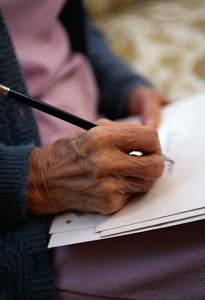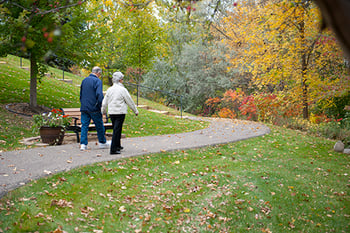7 Tips for Dealing with Grief
Elizabeth Meyer | May 20, 2015
Grief is a natural reaction to losing someone or something we love and care for deeply. It is an emotional suffering and a physical pain that tugs at your heart. Grief can be overwhelming. You may feel the sadness will never go away.
These are normal responses to a significant loss. No one can tell you the right way to grieve as everyone grieves in his or her own way. But, there are healthy ways to cope with grief so that eventually you can be stronger and permit yourself to move on. Below are a few helpful tips…
1. Talk About It
Dealing with grief is a process, not an event. Sometimes it helps to talk about the circumstances surrounding your grief with family, friends, or a professional. If others are going through your loss with you, use each other to lean on and confide in. It helps to get it out rather than keeping things bottled up inside.
 2. Write it Down
2. Write it Down
If you've experienced a sudden loss and you feel you never got a chance to say goodbye, write your feelings in a letter. Say what you would have said had you gotten the chance. You don't have to share the letter with anyone if you don't want to, but getting it all out on paper might help you find peace and closure.
3. Allow Yourself Time to Grieve
Many people believe that "throwing themselves into their work" or "staying busy" will help them get through the grieving process. On the contrary, doing so will only delay the inevitable. Of course life marches on whether we want it to or not, but resist the urge to get back into the swing of thing full-force before you've had enough time to grieve properly. Even if it's just a day or two, take some time to really come to terms with your loss.
4. Don't Use Substances to Numb the Pain
It's tempting to dull the pain with drugs or alcohol, but doing so will only cover up and delay your true feelings. You’ll still have to deal with your grief. Rather than hold your feelings at bay with substances, face your grief head on.
5. Turn to Spirituality
If you belong to a church or spiritual group, consider talking with someone there. All religions recognize grief and its special needs. Even if you don't attend regularly, you won't be turned away.
6. Take Care of Yourself
 Dealing with grief is an all-consuming task. You might not feel like bathing, eating, exercising, or otherwise taking care of yourself, but you should. Grieving takes a toll on the body and mind in many different ways. It can cause sleep problems, immune deficiencies, and make pre-existing medical conditions worse. Don't ignore your own health during the grieving process. In fact, make an effort to get up, shower, and get dressed every single morning whether you have somewhere to go or not.
Dealing with grief is an all-consuming task. You might not feel like bathing, eating, exercising, or otherwise taking care of yourself, but you should. Grieving takes a toll on the body and mind in many different ways. It can cause sleep problems, immune deficiencies, and make pre-existing medical conditions worse. Don't ignore your own health during the grieving process. In fact, make an effort to get up, shower, and get dressed every single morning whether you have somewhere to go or not.
7. Get Help When You Need it
Someone once said, "Grief isn't a disease, but it can become one." Suffering from severe grief can cause depression. Think about getting professional help if you feel hopeless, overwhelmed, or helpless. If you experience other signs of depression such as sleep disturbances (sleeping too much or too little), loss of appetite, difficulty concentrating, or decreased energy, make an appointment with a therapist for help.
Dealing with grief is a highly personal experience for each individual. No one else can quite understand how you feel or how you go through the grieving process. If you're experiencing grief for any reason, these tips can help you begin to find healthy ways to cope with it. Remember, there is no timetable on grief. It's up to you.
